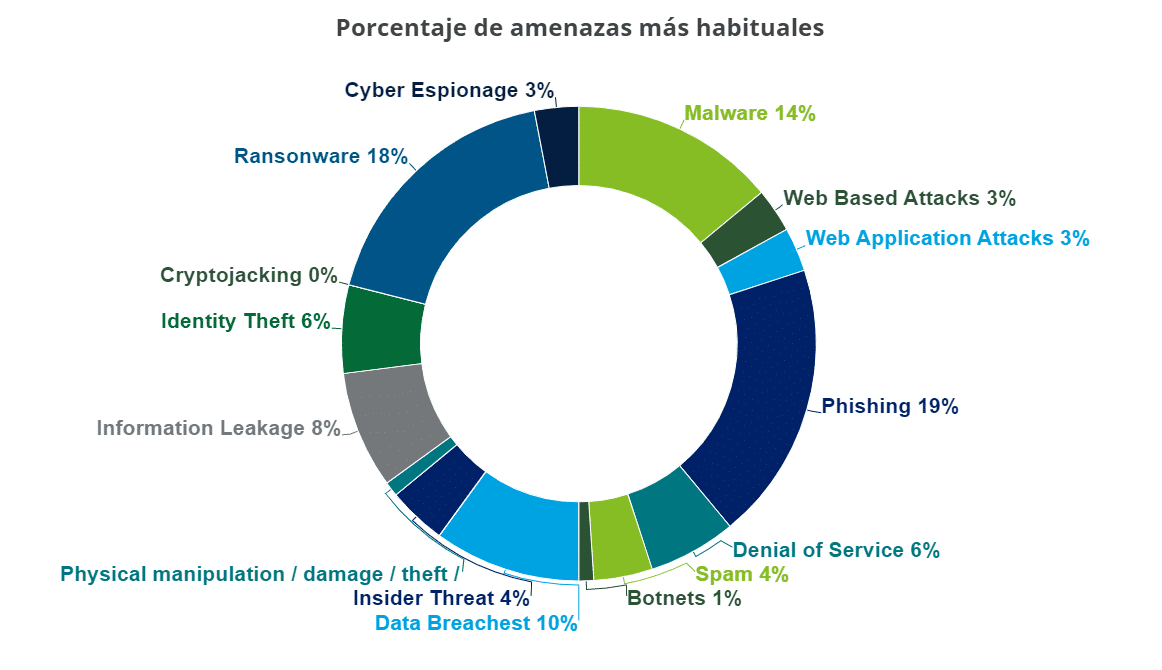What types of cyber attacks is your company exposed to? When we talk about these cyber risks in companies, the first thing that comes to mind are large companies such as Yahoo, Facebook or Telefónica. And due to the repercussions of these attacks, they are the ones that usually dominate the IT security news.
However, small and medium-sized companies, which are usually less protected, are regularly targeted by hackers. And the data reflects this: 7 out of 10 cyberattacks are on SMEs.
The reality is that no organization is free from any type of IT attack: large companies because of the relevance and volume of their data and smaller ones because of their vulnerability.
What is a cyber attack?
A cyber-attack is a computer attack produced by the figure known as a hacker who acts in most cases under personal motivations or challenge, economic or political. These cyber-attacks can affect organizations (from institutions to companies) or individual users. Cyber-attacks amount to 0.8% of the world’s GDP, estimated at 74.15 billion euros.
7 types of cyber attacks on companies
In this post we analyze 7 of the most common types of cyber-attacks that are expected to continue to affect the cybersecurity in Spain during 2022.
1. Spyware
As the name suggests, the purpose of this cyberattack is to spy. Spyware is a type of malware that is difficult to detect and collects data without the computer owner’s consent for later use.
Generally, hackers using this type of malicious virus sell the data to third parties, uncovering the company’s most sensitive information: customer data and their own. As cybersecurity experts warn, this virus can be especially dangerous in companies that use Big Data, as this data bank can become a succulent booty for cybercriminals.
Spyware can also affect on a small scale, on an individual computer, obtaining information about the user’s habits and personal information, such as credit card numbers.
2. Trojan
Remember the story of the Trojan horse? History repeats itself with one of the most popular malware out there, the Trojan horse. It all starts with a seemingly harmless program, but when executed it gives the cybercriminal access to the computer.
What does this mean? They can access sensitive data, record passwords or give access to communications ports so that someone can access the computer remotely.
3. Phishing
Impersonating a trustworthy entity that contacts us via email, SMS or instant messaging is the first step of Phishing, another attack that threatens computer security.
In Phishing, which translates as “impersonation”, hackers have to impersonate our bank or any money remittance company to generally ask for bank details on a fraudulent website.

4. Denial of Service (DoS)
Can you imagine one of your company’s main systems being blocked? This is the target of a Denial of Service (DoS), a cyber-attack based on saturating ports with multiple streams of information that overload the computer or machine.
Another very similar practice is the distributed denial of service (DDoS) attack that produces this huge amount of information aimed at saturating a computer from a botnet.
5. Ransomware
Ransomware is literally based on a hijacking of the computer (s). After blocking it, hackers demand a ransom in exchange for regaining access. Are you familiar with some famous ransomware such as WannaCry or Petya?
This malicious virus can reach a company through a harmless attachment or an infected website.
6. IWarm or Worms
The name of these “computer worms” is completely graphic: these viruses can replicate themselves on other computers and spread very fast. This makes them a particularly sensitive cyber-attack for a company. The way to activate them is as simple as opening an attachment or accessing a malicious link.
7. Adware
Adware is dedicated to displaying unwanted advertising. These programs are considered malicious if they collect information about your likes and dislikes without your consent.
What types of cyber attacks will most affect businesses in 2024?
If we focus on the cyber-attacks that most concern companies in Spain and around the world, 3 stand out: Phishing (phishing), Ransomware (data hijacking) and Malware (malicious software) in general. According to the recent Deloitte study, The State of Cybersecurity in Spain, these are, in order, the most common threats:
- Phising
- Ransonware
- Malware
- Data Breach (Data Filtering)
- Information Leakage (Information Leakage)
- Identity Theft
- Denial of service
- Insider Threat
- Spam
Image extracted from the study El estado de la ciberseguridad en España.
What is cyber risk insurance?
As IT security measures in companies grow, cyber risks are increasing and malware is becoming more sophisticated.
If you have a business and you want to cover your back against this type of attacks, from PIB Group Iberia we offer you our cybersecurity insurance for companies based on prevention and response to possible attacks.
It is a complement to cyber-attack prevention and established cybersecurity: a service that seeks to minimize the consequences of potential attacks and responds to possible indemnities, penalties or losses resulting from paralysis.






